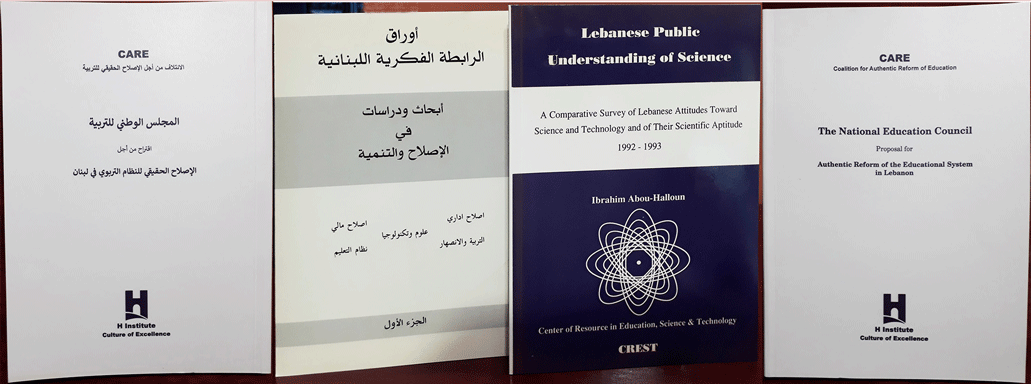Serving a clear vision for enlightened citizenship and sustainable development
.
.
Formal education must be a quality public good that is affordable to all school-age youngsters and that is designed to empower students for coping with excellence with our rapidly changing world. In particular, students must be empowered for self-fulfillment, lifelong learning, enlightened citizenship, successful and propitious career, and significant contributions to sustainable development at the local, national, and global levels.
Century-old paradigms must then be transcended toward systemic paradigms with:
- Clear national and local vision and policies for education in relation to development, along with reasonable standards of excellence strictly reinforced at all levels.
- Systemic governance of entire educational systems and individual institutions whereby actors within and across various system organs share power and work together with distributed responsibility, and individual educational institutions are endowed with relatively high level of autonomy so that teachers and other stakeholders in any institution can properly adapt their curricula and various operations to the actual potentials, needs, and aspirations of its students and local community.
- Across-the-board convergence that annihilates segregation within and between general education and technical and vocational (career) education, and among disciplines in the same or different fields, especially those like in arts and science that are being wrongly assumed remotely related.
- Pre-college certification based on student evolution across different grades, and not on a single set of exit exams.
.

.
Select Publications:
.
Time to heed resolutely the alarm raised 35 years ago over an everlasting pandemic in science education. (2020). HPS&ST Newsletter, Nov. 2020, 5-10.
In 1985, we published the two Most Memorable Articles of the year in the American Journal of Physics, raising the alarm over common sense beliefs about physical systems and phenomena that interfere with students’ learning of science and that continue until these days to plague science education like a terminal cognitive pandemic. Critical factors to turn the situation around are discussed in the context of the modeling pedagogical framework. Full Text
.
Differential Convergence Education from Pluridisciplinarity to Transdisciplinarity. (April 2020).
Five modalities of differential convergence that may be deployed in the context of any curriculum, including discipline-based curricula, are proposed in a systemic perspective. These are, in increasing order of cohesiveness and productivity, pluridisciplinarity, multidisciplinarity, interdisciplinarity, crossdisciplinarity, and transdisciplinarity, with the last two as ultimate modalities for secondary school and university respectively. Full Text
Supplement: Guidelines for systemic differential convergence education. (April 2020).
General guidelines for carrying out differential convergence projects to help students develop efficient competencies for addressing daily life issues from the perspective of many disciplines brought together cohesively and productively from different fields and different realms under systemic pedagogical frameworks.
Please click here to request the Supplement.
.
Systemism for Global Citizenship with Strong National Identity. (December 2019).
The concept of global citizenship, along with various forms of friction and hostility around the globe, led to major disarray, and even dismay, in the concepts of culture and national identity. Systemism can significantly alleviate the situation when consciously and purposefully adopted by individuals and communities, in education and practice. Abstract
.tudent certification based on their evolution across different grades, and not on a single set of exit exams.
 .
.
.
Toward authentic reform of education in Lebanon:
A synopsis of major systemic changes (September 2019).
نحو اصلاح حقيقيّ للتربية في لبنان: ملخّص التغييرات الرئيسة في النظام التربوي. أيلول 2019
The Lebanese educational system is long due for a major reform under clearly defined vision and broad national policy for education and development that optimally meet local and global realities of the 21st century. The envisioned reform would especially require and bring about new concepts of education, system, governance, pedagogy, school, curriculum, student, teacher, and every other organ, medium, and setting involved in the educational system. This document offers a synopsis of major systemic changes that the reform should bring about. Changes are outlined in five tables pertaining to reform context, foundations of education, educational system, school curricula, and professionalism in the educational sector.
Download full text in: English عربي
.
Toward authentic reform of education in Lebanon:
The National Education Council (July 2019).
المجلس الوطني للتربية. تموز 2019
The National Education Council (NEC) is a proposed Lebanese public, autonomous, and independent organism that serves the primary function of upholding formal education as a high quality public good and a significant national investment for the 21st century and beyond. The Council would work in accordance with an explicitly spelled out national policy for education and development in order to serve a clear national educational vision with the highest quality standards possible. This document succinctly provides the rationale for NEC and proposes its mandate and structure.
Download Executive Summary in: English عربي
.
Toward Authentic Reform of Education in Lebanon. (December 2018).
نحو إصلاح حقيقي للتربية في لبنان. كانون الثاني 2019
Premises and related measures for authentic reform of education are recommended about seven major aspects: equity and quality, lifelong learning, global citizenship, human mind and brain, technology, profession, and systemism.
Download full text in: English عربي
.
Premises for authentic diplomas in the context of reformed curricula and educational systems. (May 2016).
مرتكزات أساسيّة لشهادات مصداقة في إطار مناهج تربويّة متطوّرة. أيّار 2016
General education diplomas must be revamped in the context of reformed curricula and educational systems that bring about some reliable passport for student transition to higher / upper level education. That passport might include some form of a “diploma” that does not come about as a consequence of exit exams, but as part of, or as a summative account of, comprehensive school transcripts.
Download full text in: English عربي
.
Upholding our conventional exit exams is a crime against students and society. (April 2016).
التمسّك بالامتحانات الرسميّة التقليديّة جريمة بحقّ الطلبة والمجتمع . نيسان 2016
The Lebanese Brevet and Baccalaureate exams (as they are still commonly known) have been around for quite awhile that most people are taking them for granted. Very little research has been undertaken to ascertain the viability (validity, reliability, efficiency, etc.) of these national exit exams and their repercussions on students, teachers, and other stakeholders in the educational community and on the nation at large. However, what is sometimes revealed about these exams and research from around the globe about similar high stakes exit exams provide some indication as to how flawed they are and how grave their repercussions are on various stakeholders.
Download full text in: English عربي
.
Time to abolish high stakes exit exams as we know them. Naharnet, 30 March 2016.
High stakes exams have been around for quite awhile that most concerned people are taking them for granted. These exams come in a variety of forms and scales, and serve diverse purposes like end of program certification, entrance to particular university programs, or induction into certain professions. Research from around the globe shows that high stakes exams have critical viability flaws (validity, reliability, efficiency, etc.) and grave repercussions on students, teachers, and all other stakeholders in the educational community and concerned professional communities. Full Text
Lebanese Public Understanding of Science. (1993). Jounieh, Lebanon: CREST.
A 102 items survey was developed, validated, and administered to about one thousand Lebanese people of different background to ascertain: (a) how interested they are in certain scientific and non-scientific matters related to everyday life, (b) what sources they rely upon to acquire information about such matters, (c) how they would like certain science and technology (S&T) matters to be developed in Lebanon, and (d) their actual knowledge about basic facts, concepts, laws, and methods of inquiry in different scientific disciplines. Results are presented, analyzed, and discussed, and recommendations are made regarding the state of S&T in Lebanon in relation to aspired national development. Cover & TOC
.
.
.
LJSME editorials:
Lebanese Journal of Science & Mathematics Education. (Founder, 1988. Editor, 1988-1990). Beirut, Lebanon: LASMT.
Select publications in Arabic:
Public Attitudes toward the Municipal System in Lebanon. (1999). Junieh, Lebanon: LIA.
مواقف اللبنانيين من البلديات والانتخابات البلدية في ظل النظام السياسي القائم في لبنان: دراسة استطلاعية احصائية. مع د. مرغريت حلو وغيرها. (1999). منشورات الرابطة الفكرية اللبنانية
Studies in Reform and Development. Editor. (1993). Junieh, Lebanon: LIA.
أبحاث ودراسات في الاصلاح والتنمية. مع د. مرغريت حلو وغيرها. (1993). منشورات الرابطة الفكرية اللبنانية
Science & technology for development. (1993). Studies in Reform and Development, 47-81. Junieh, Lebanon: LIA.
علوم وتكنولوجيا للتنمية. (1993). أبحاث ودراسات في الاصلاح والتنمية، 47-81. منشورات الرابطة الفكرية اللبنانية
Which citizen, what nation [Monograph]. (1992). Junieh, Lebanon: LIA.
أي مواطن؟ أي وطن؟ (1992). منشورات الرابطة الفكرية اللبنانية
An educational system for development. (1991). Al-Anwar.
نحو نظام تربوي جديد يحقق من خلاله المواطن ذاته والوطن تقدمه. الأنوار، 4 شباط 1991
Productivity of university professors in Lebanon. (1988). Ad-Diyar.
مشكلة الأستاذ الجامعي في لبنان. الديار، 19 تموز 1988
The university in Lebanon: Facts and prospects. (1988). Ad-Diyar.
الجامعة: مفهومها، واقعها اللبناني، وصورتها المرتجاة. الديار، 16 آب 1988
Towards a free, equitable and committed education. (1986). Al-Anwar.
نحو تربية لبنانية حرة، عادلة وملتزمة. الأنوار، 30 كانون الثاني 1986

